Wondering about the best supplements for IBS? I have 9 to share.
This post was originally published in July of 2020. It has been updated in 2025 to reflect updated information and sources to fully help IBS sufferers.
IBS Awareness Month
April marks IBS Awareness Month, and April 19 in particular this year is World IBS Day.
And while this year’s theme is increasing public awareness of IBS and helping to destigmatize the different types of IBS, I’m here to share that we do this in the A Gutsy Girl community 24/7, 365 days a year.
In other words, if gut health, your gut bacteria, and the entire digestive tract are topics near and dear to your heart, then you’re in the right place year round.
However, here are some interesting facts I found, relevant to the now and recent research:
- IBS is common with prevalence estimated at 5% to 10% worldwide. Yet many people remain undiagnosed and unaware that their symptoms indicate a medically recognized disorder. (source)
- IBS is a chronic disease related to the large intestine, it is found to be more common in women than men. It mostly affects people who are 45 years of age or younger. (source)
- IFFGD (International Foundation for Gastrointestinal Disorders) declared April as the awareness month for IBS in 1997.
- People with IBS report restricting their activities 73 days a year due to their symptoms – that’s 20% of the year! (source)
There is also a podcast episode to coincide with these stats for IBS Awareness Month.
You’ll enjoy this short, bite-sized episode.
Subscribe Today:
Apple Podcasts | Spotify | iHeart Radio | RSS
Resources
- Digestion and Women
- Episode 1: My Full Story
- 14 Irritable Bowel Syndrome Stats
- The Gutsy Bundle (now includes Break Down!)
- A Gutsy Girl’s Bible
- A Gutsy Girl supplement line, guthealingsupplements.com
Don’t Miss These Thoughts
- April is IBS Awareness Month
- 14 irritable bowel syndrome stats and numbers
- Digestion and Women; does it look different than for men?
- Why should you be relentless in not making IBS a taboo topic?
Symptoms of IBS
Before we discuss more about ways for combatting IBS, let me just share some symptoms.
First, IBS stands for irritable bowel syndrome which is vastly different from IBD (inflammatory bowel disease).
In the differences between IBS vs IBD, you are able to clearly see how different the two are.
For now, here are many of the IBS symptoms:
- abdominal pain and/or abdominal cramps
- constipation
- diarrhea
- both constipation and diarrhea, alternating
- gas
- bloating and/or distention (not the same things)
- mucus in stool
- nausea
If you have IBS, your personal symptoms will vary depending on if you lean more towards constipation or diarrhea.
Severe pain, blood in stools, weight loss and other advanced complications are typically more in alignment with IBD than IBS.
Do not wait; see a doctor now if you’re experiencing any of these things.
IBS Root Causes
While IBS is a common condition, it should not be considered “normal.”
Furthermore, IBS is not “just” IBS like many will tell you it is. However, it is “just” a big pain in the a@#. The reason?
It’s rarely ever “just” IBS. There is always something more going on.
In fact, I have 7 root causes of IBS.
Here is one of them:
I wrote a book on leaky gut so I know a thing or two about it.
To put it simply, leaky gut is when the junctions which are supposed to be tight lining the intestines loosen, causing food particles that should not seep through to seep through.
And when they do, all sorts of problems can arise.
The Leaky Gut Meal Plan, Sarah Kay Hoffman
But again, though this is a “root cause” it’s “technically” not much different than IBS.
Leaky gut is actually leaky gut syndrome, so again, a collection of symptoms with an origin that cannot be identified.
If you want to dig deeper on all things leaky gut, consider these:
- Leaky Gut Meal Plan (4 Weeks to Detox and Improve Digestive Health)
- How Long Does it Take to Heal Leaky Gut
- Leaky Gut Causes
- 31 Specific Things to Heal a Leaky Gut
- Leaky Gut Syndrome
- ….and just like with SIBO, if you search ‘leaky gut’ in the upper corner, you’ll find many more articles.
Anyways, there are so many ways for IBS patients to naturally help with the chronic aches and pains that accompany the diagnosis.
While I think IBS sufferers absolutely need to investigate the underlying cause, I also believe there are both diet + lifestyle changes and supplements that can help right now.
Dietary + Lifestyle Changes for a Positive Effect on IBS
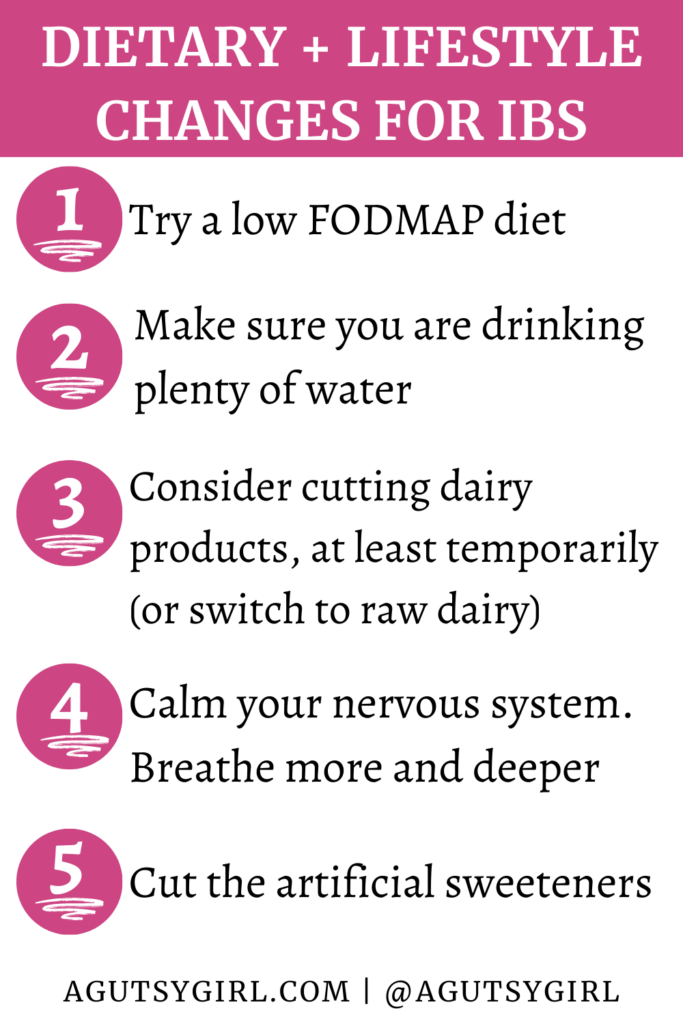
Here are some of the best ways for making dietary changes and lifestyle habit swaps.
- Try a low FODMAP diet. For many with IBS this can help. However, don’t just haphazardly go about it. If you want to learn more, check out the FODMAP Diet Plan podcast episode.
- Make sure you’re drinking plenty of water.
- Consider cutting dairy products, at least temporarily, and/or switching to raw dairy.
- Calm your nervous system. Breathe more and deeper.
- Cut the artificial sweeteners.
Diet and lifestyle are underutilized, and I think if we could really hone in there more before anything else, massive changes would happen.
However, when it comes to the treatment of IBS, supplements are commonly used.
Note: Whenever you think you’re going to add a supplement to your regimen, be sure to check with your practitioner. This is never medical advice, simply just research + personal experience.
By the way, notice I didn’t say to give up: dairy, gluten, soy, corn, sugar, meat, FODMAPs, etc, etc, etc all at once? It’s a slippery slope once you start. Instead, it’s a good idea to start in a sane way, keep a meticulous food and lifestyle gut healing journal and go from there.
9 Best IBS Supplements
Click HERE to save this post for later.
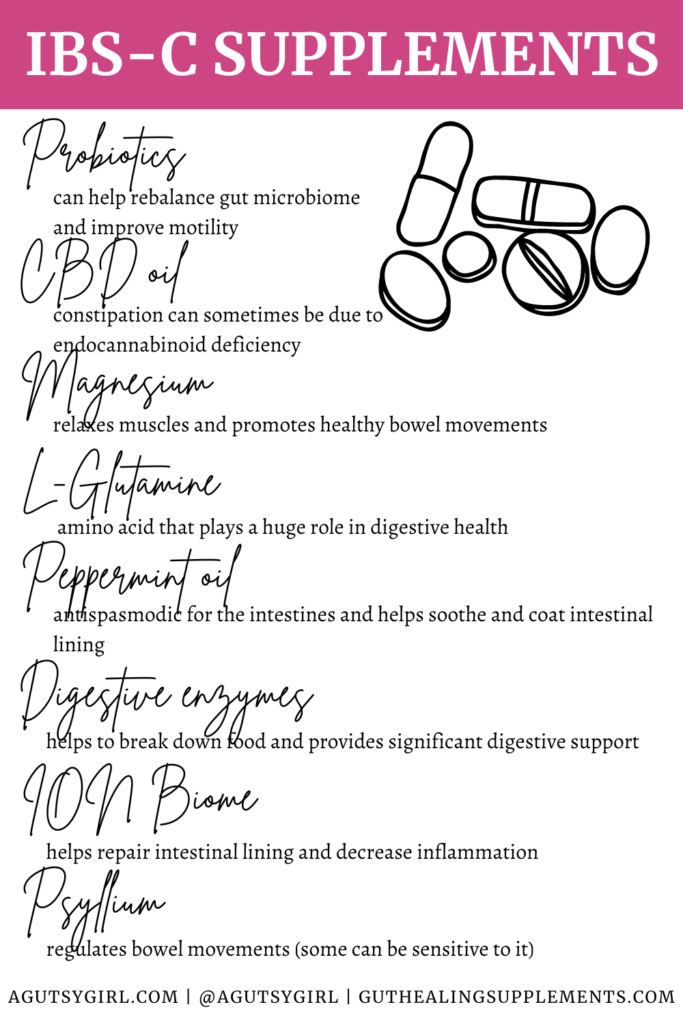
Did you know that the global irritable bowel syndrome treatment market is expected to reach a market value of USD 2,988.6 million by 2023 from USD 1,890.9 million in 2017 and is expected to register a CAGR of 7.58% during the forecast period from 2018 to 2023? (Grab 13 more IBS stats HERE.)
And when I say “treatment market,” what that means is the amount of money we will spend on supplements and medications to help the IBS diagnosis.
Believe me when I say that you absolutely, positively, 1,000% MUST treat the root cause in order to get well.
But some of that money can be well spent.
I believe in these 9 IBS supplements.
IBS – C, IBS – D, and/or IBS – M?
For each of the 9 supplements below, I’ve also made note of what type of IBS they are primarily used for. Work with your doctor, as always, on any and all of them.
- constipation dominant = IBS – C
- diarrhea dominant = IBS – D
- mixed, both constipation and diarrhea, alternating = IBS – M
Berberine: IBS-D
Berberine is an alkaloid found in many plants, most notably in goldenseal (Hydrastis canadensis), barberry (Berberis vulgaris), Oregon grape (Berberis aquifolium), and goldthread (Coptis chinensis).
These plants have a long history of use for several health conditions.
Clinical studies with isolated berberine have shown significant success in the treatment of acute diarrhea, irritable bowel syndrome, type 2 diabetes, high blood pressure, elevated blood lipids, Alzheimer’s disease and cancer.
In particular, Berberine may be an effective way to manage symptoms of IBS-D, reducing stool frequency.
Dr. Nirala Jacobi discusses this one in podcast episode 40, SIBO vs IBS HERE.
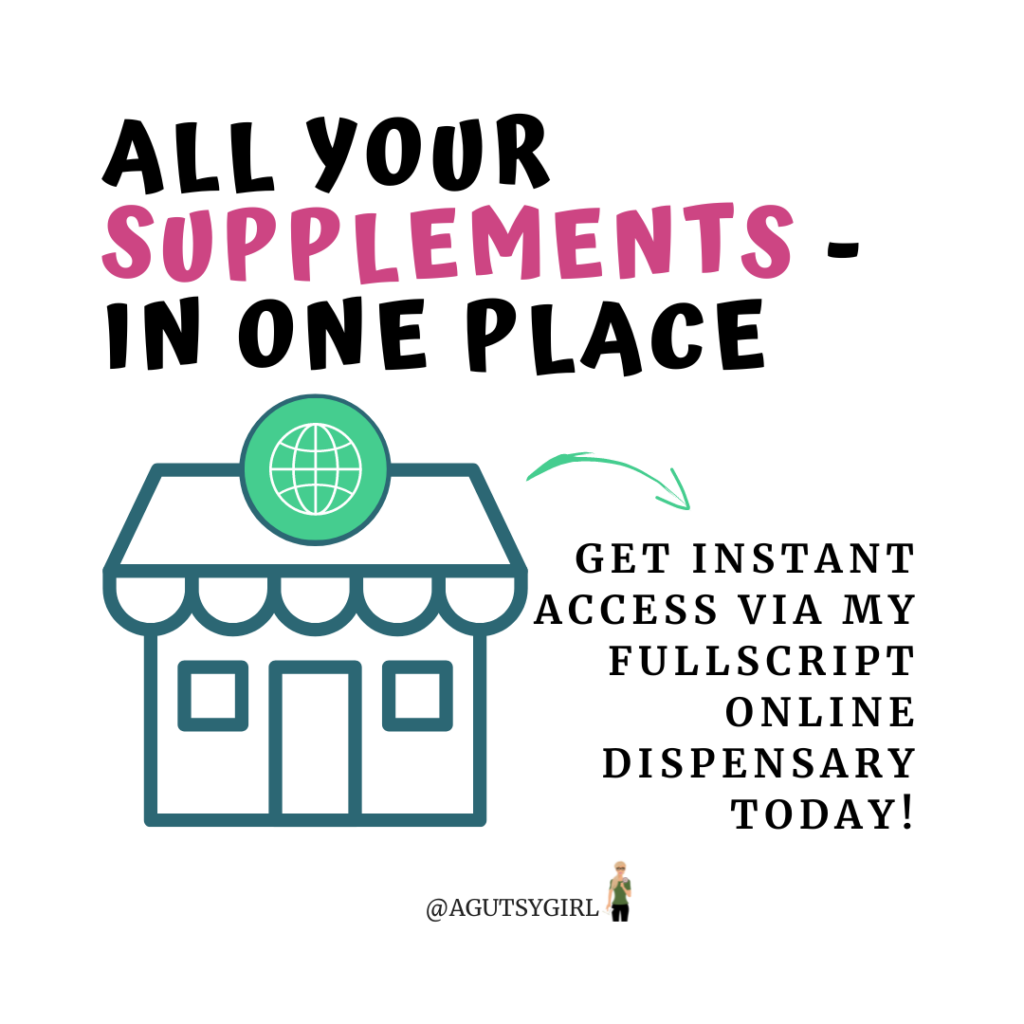
You’ll find Berberine + 100’s of others via my Fullscript Online Dispensary.
Once you’re signed up, I’ll increase your savings to 20%. After your first purchase, I’ll increase that to 25% off for life.
Probiotic: IBS – C, IBS – D, IBS – M
So how would you know which probiotic to take?
Well, you need to understand probiotic species and different strains, which you can learn about HERE.
Depending on what those properties are and what they aim to do will determine if it’s the best probiotics for you. Different probiotics are intended for different conditions.
For example:
- Saccharomyces boulardii is a probiotic yeast that can help support digestive health by producing lactate, B vitamins, and targeted antimicrobials to defend against pathogenic gut infections. S. boulardii has also been shown to be immunoprotective through the upregulation of IgA and IgG secretions in the intestines. (source)
- Bacillus HU36 produces high levels of carotenoids such as Lycopene, Lutein, Astaxanthin, Zeaxanthin and Beta-Carotene. Along with these crucial antioxidants, Bacillus HU36 also produces quinols and essential vitamins B and K2.
- Bifidobacterium Lactis Bb-12 has been shown to be conducive for constipation. (source)
This is why not all probiotic supplements work for everyone. And it’s something I demonstrate via Should I Take a Probiotic with SIBO?
Yes, of course my preferred and most commonly recommended probiotic is the Just Thrive probiotic, but again, you must choose what’s right for YOU.
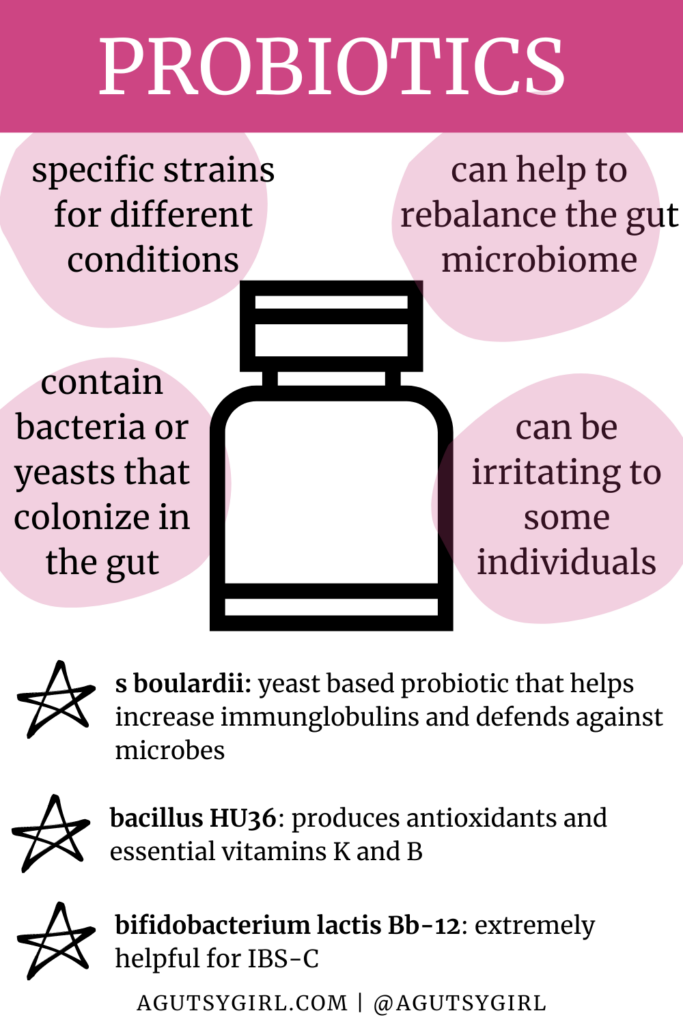
CBD Oil: IBS-C
According to the post highly-regarded nutritionist Ashley Koff wrote, CBD for Digestion,
If you suffer from IBS-C, then, CBD oil might be for you. According to Ethan Russo, cannabis researcher and physician, endocannabinoid deficiency may contribute to IBS, thus full spectrum hemp-derived CBD or a CBD / THC blend may help prevent or address IBS symptoms.
You can learn more about the Endocannabinoid System HERE.
Magnesium: IBS-C
Magnesium simply relaxes your muscles. When you supplement with magnesium, you increase water in your intestines which help initiate peristalsis (the wavelike motion which moves fecal matter through your intestines).
Peristalsis also pushes food into your stomach.
To learn all about why magnesium is a great IBS supplement, check out magnesium, constipation, and digestion HERE.
L-Glutamine: IBS – C, IBS – D, IBS – M
L-glutamine is the most plentiful amino acid in the body and supports intestinal health. It may work for those with IBS because of this role.
According to Dr. Amy Myers, “People with IBS that is stress induced may find that increasing their intake of L-Glutamine mitigates the impact of cortisol, improving muscle function and helping your body resolve spasms.”
To learn more about L-Glutamine, check out L-Glutamine for Gut Healing HERE.
Peppermint Oil: IBS-C
Peppermint oil (PO) has intrinsic properties that may benefit patients with irritable bowel syndrome (IBS) symptoms.
It contains contains L-menthol, which blocks the calcium channels in smooth muscle. This produces an antispasmodic effect in the gastrointestinal tract.
Peppermint oil also has anti-inflammatory properties and may support the immune system. There are many ways for taking peppermint oil, but one common way is via an enteric-coated peppermint oil capsule.
With an entire-coated capsule, the likelihood of stomach acid production lessens.
However, do make note that peppermint oil is not for those of you with GERD / Acid Reflux. Avoid if you have this condition plus IBS.
Digestive Enzymes: IBS – C, IBS – D, IBS – M
“Digestive enzymes” is a broad term that includes pancreatic enzymes, plant-derived enzymes and fungal-derived enzymes.
They help turn larger molecules found in foods (carbs, protein and fats) into more easily absorbed particles (such as amino acids, fatty acids, cholesterol, simple sugars and nucleic acids).
In my opinion, they are one of the best ways to see significant improvement immediately because they allow you to eat while giving you the added digestive system support.
Digestive enzymes are helpful for food intolerance and can massively improve your quality of life.
The body can then actually use these particles to function and for energy. To learn more about digestive enzymes read What are Digestive Enzymes?
Psyllium: depends; could be all
Fiber supplementation, particularly psyllium, is both safe and effective in improving IBS symptoms globally.
Long-chain, intermediate viscous, soluble and moderately fermentable dietary fiber, such as psyllium husk results in a low gas production and the absence of the symptoms related to excessive gas production.
Psyllium is an example of soluble fiber (as stated), and soluble fiber dissolves in water and is digested by bacteria in the large intestine.
This is the fiber that adds bulk to the stool and it helps prevent things like Diverticulosis and Hemorrhoids.
The effects of type of fiber have been documented in the management of IBS, and it is known to improve the overall bowel habits in patients with IBS.
ION Biome (previously Restore): IBS – C, IBS – D, IBS – M
According to doctor and founder of ION Biome, Zach Bush, “IBS and IBD are conditions that have their root cause in inflammation. The source of this underlying chronic inflammation and dysfunction of the immune system is rooted in the injury to the barrier system of the gut lining – small proteins called tight junctions – protecting you from the outside world.
Unfortunately, in our daily lives now we face the presence of potent toxins to these tight junctions, herbicides like RoundUp, pharmaceuticals, refined gluten, etc. ION Biome supports the presence and integrity of these critical barrier systems.”
Using ION Biome is also part of a long term solution that can yield positive results.
You can read more about ION Biome HERE.
Sources: HERE, HERE, HERE, HERE, HERE, HERE, HERE, HERE, HERE, HERE, and HERE.
Some other supplements I’ve used on my journey with IBS-C in particular include:
- Vitamin C. Something that you might not know is that too much Vitamin C can cause diarrhea. It’s for this reason why some choose to take extra while severely constipation. You just have to remember that diarrhea is one of the side effects of too much Vitamin C.
- Bitters. Bitters are herbs that support digestive function by stimulating bitter receptors on the tongue, stomach, gallbladder, and pancreas.
- HCL. Low stomach acid is oftentimes a cause for slow motility. This occurs when the stomach does not have enough acid to break down proteins and other molecules properly, resulting in undigested food. Because of it, HCL can be a great supplement addition. In fact, we added HCL to our digestive enzyme, Break Down, formula.
How are they working?
So how to know if they are working for you?
- Ask yourself in a weekly recap, “How is this working for me?” See more about this exercise HERE.
- Keep that journal! Keeping a food and lifestyle journal is your #1 chance for success. You can grab my 90-day PDF HERE or have me ship a beautiful, spiral-bound journal to your doorstep.
Are there any IBS supplements you’d add to this list? What has worked best for you?
If you liked this post, you might also enjoy:
- All of these supplements and my recommendations for each can be found via the Master Gutsy Resource links spreadsheet HERE
- Soluble vs. Insoluble Fiber
- 14 Irritable Bowel Syndrome Stats
Xox,
SKH
🤰 bloating be gone! weight loss through optimal gut health for women
💃ʜᴇᴀʟ ʏᴏᴜʀ ɢᴜᴛ. ʜᴇᴀʟ ʏᴏᴜʀ ʟɪfe.
🫶🏻 founder gutbyome.com

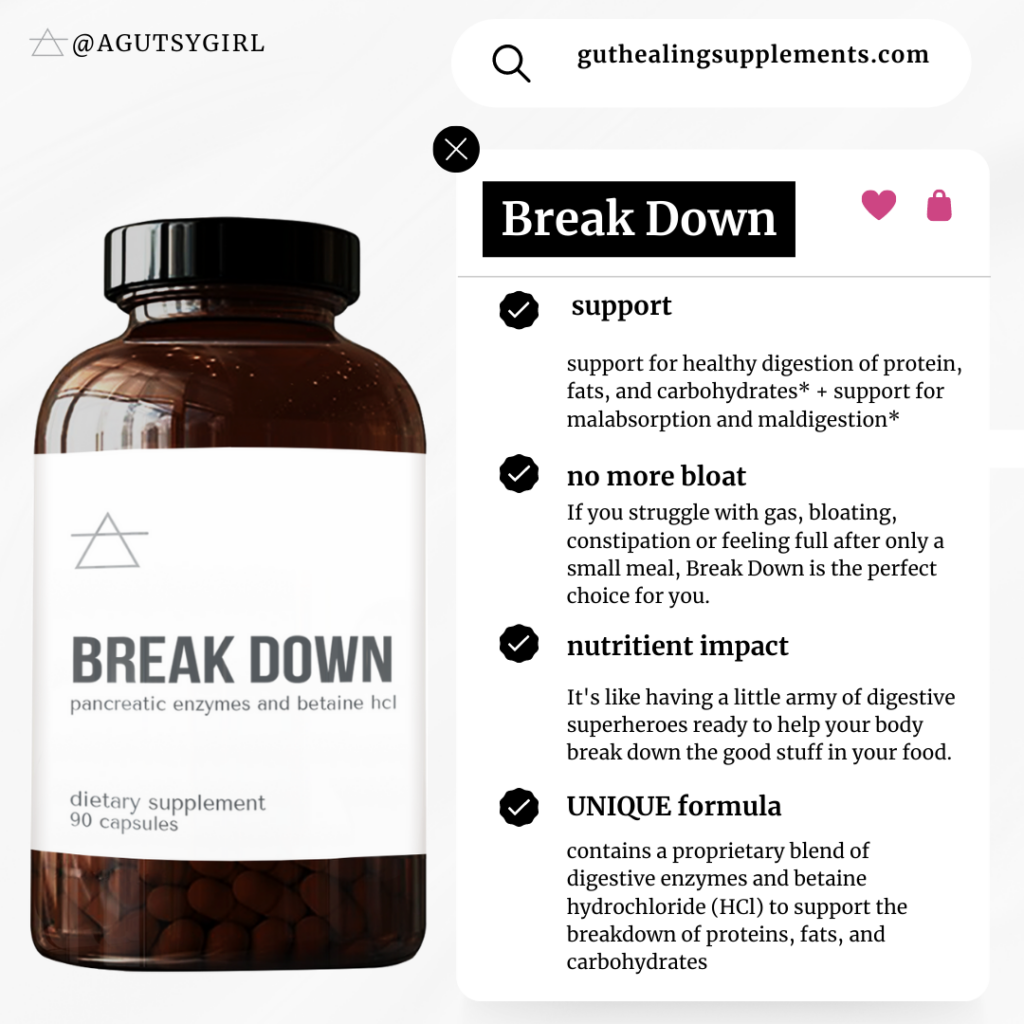

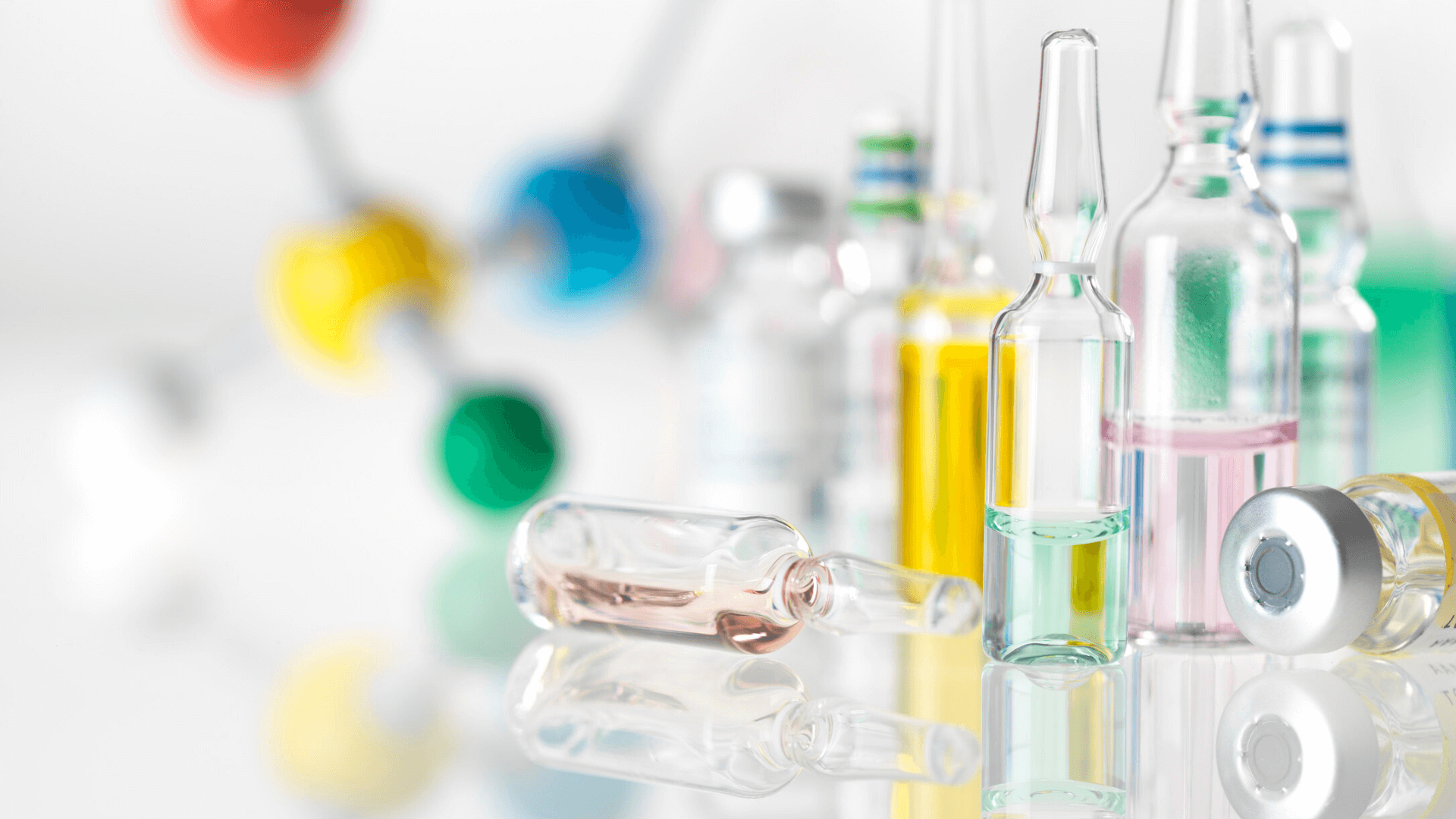


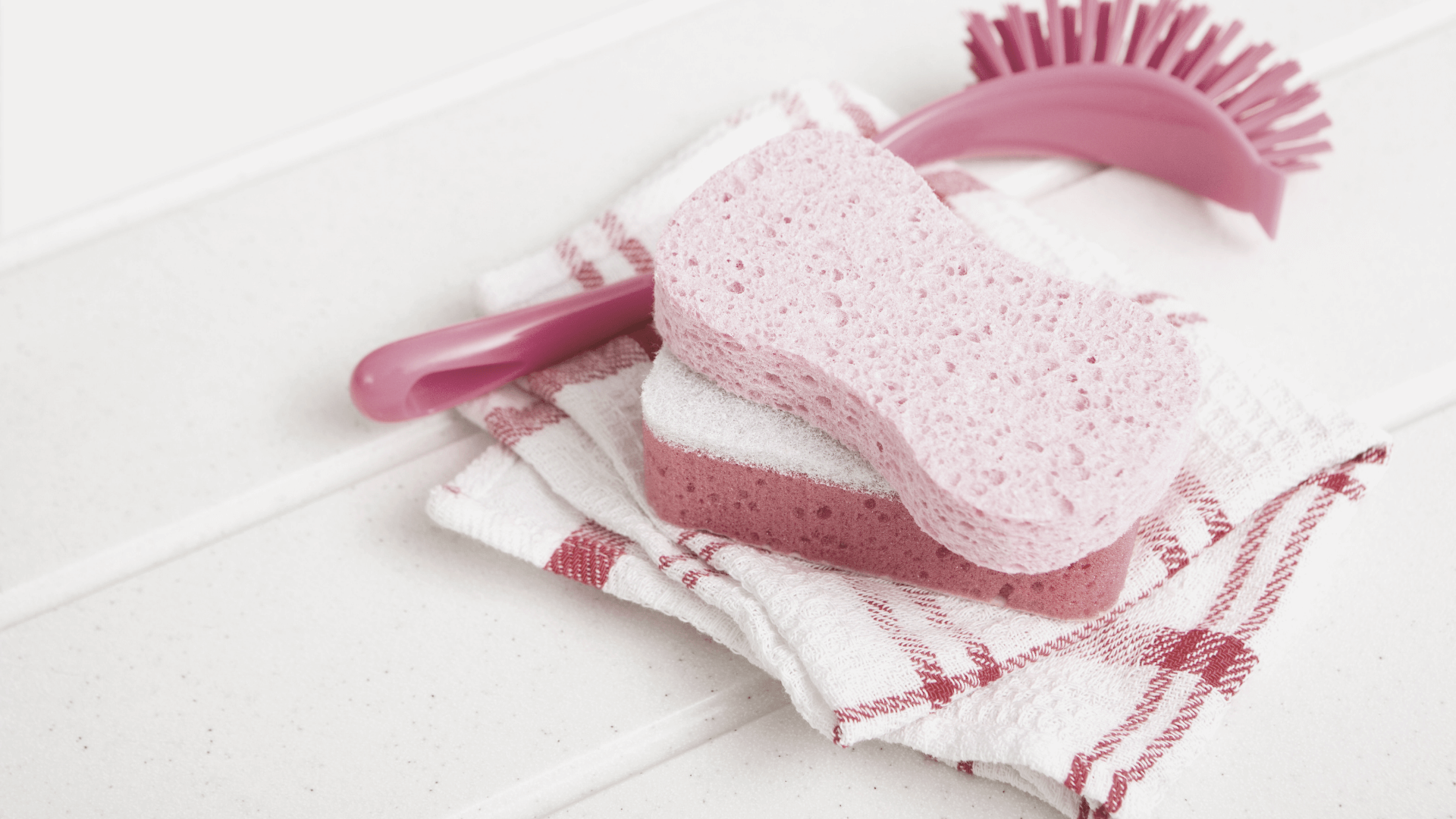
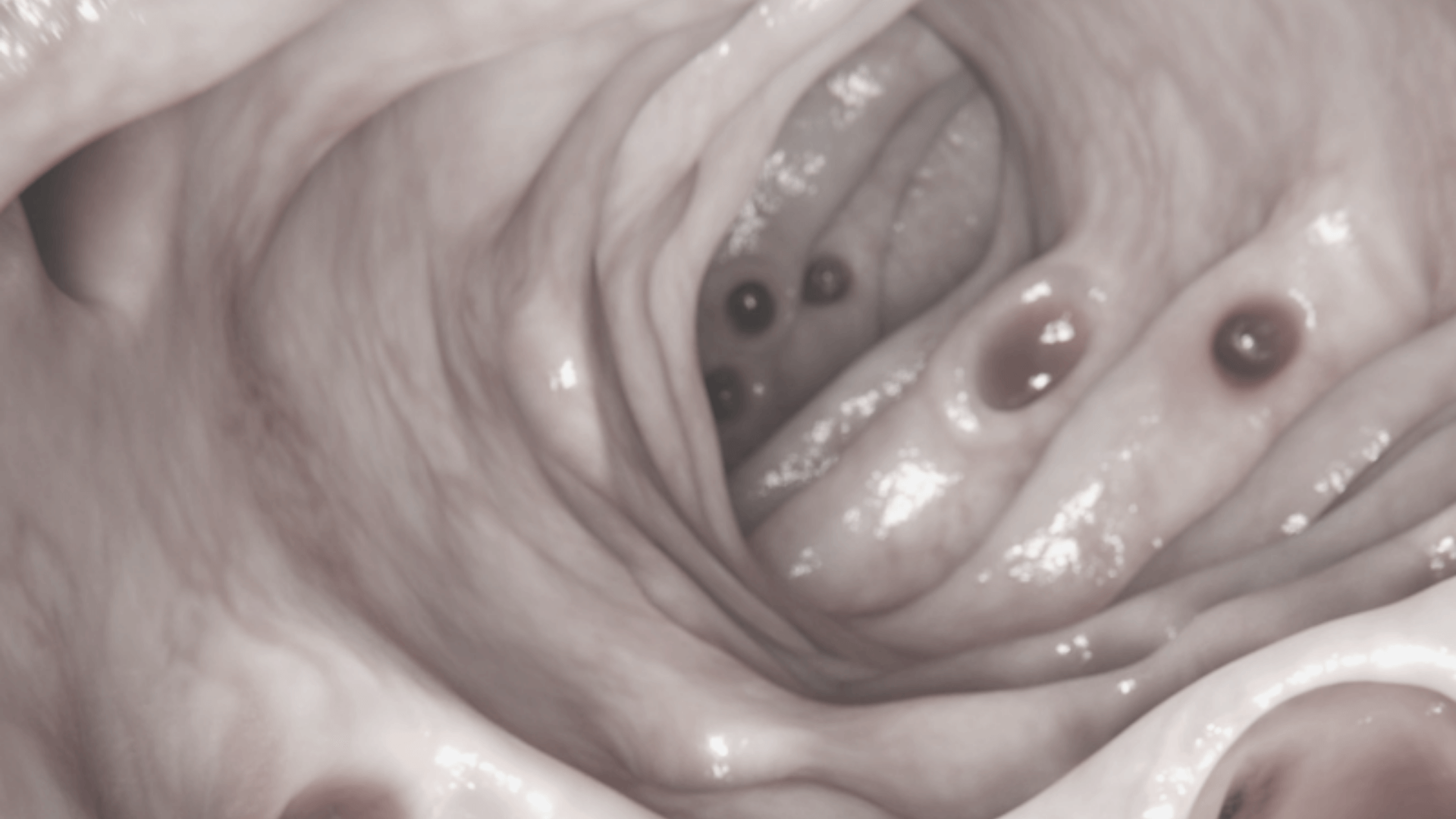
Thanks for this helpful post. I’m an IBS-D who’s had excellent luck with the Japanese probiotic drink Yakult (lactobacillus paracasei Shirota). One bottle a day keeps a heck of a lot of discomfort away.
Waaw so informative am planning to start on the supplements soon …to see how it goes with my IBS-D